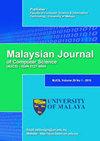EXPERT RECOMMENDATION THROUGH TAG RELATIONSHIP IN COMMUNITY QUESTION ANSWERING
IF 1.1
4区 计算机科学
Q4 COMPUTER SCIENCE, ARTIFICIAL INTELLIGENCE
引用次数: 1
Abstract
Community Question Answering (CQA) services are technical discussion forums websites on social media that serve as a platform for users to interact mainly via question and answer. However, users of this platform have posed dissatisfaction over the slow response and the preference for user domains due to the overwhelming information in CQA websites. Numerous past studies focusing on expert recommendation are solely based on the information available from websites where they rarely account for the preference of users’ domain knowledge. This condition prompts the need to identify experts for the questions posted on community-based websites. Thus, this study attempts to identify ranking experts’ derived from the tag relationship among users in the CQA websites to construct user profiles where their interests are realized in the form of tags. Experts are considered users who post high-quality answers and are often recommended by the system based on their previous posts and associated tags. These associations further describe tags that often co-occur in posts and the significant domains of user interest. The current study further explores this relationship by adopting the “Tag Relationship Expert Recommendation (TRER)” method where Questions Answer (QA) Space is utilized as a dataset to identify users with similar interests and subsequently rank experts based on the tag-tag relationship for user’s question. The results show that the TRER method outperforms existing baseline methods by effectively improving the performance of relevant domain experts in CQA, thereby facilitating the expert recommendation process in answering questions posted by technical and academic professionals.社区问答中通过标签关系进行专家推荐
社区问答(CQA)服务是社交媒体上的技术论坛网站,是用户主要通过问答进行互动的平台。然而,由于CQA网站中的信息铺天盖地,该平台的用户对反应缓慢和对用户域的偏好表示不满。过去许多专注于专家推荐的研究都是基于网站上的信息,这些信息很少考虑用户的领域知识偏好。这种情况促使人们需要为社区网站上发布的问题确定专家。因此,本研究试图从CQA网站中用户之间的标签关系中识别排名专家,以构建用户档案,其中他们的兴趣以标签的形式实现。专家被认为是发布高质量答案的用户,系统通常会根据他们以前的帖子和相关标签推荐他们。这些关联进一步描述了经常同时出现在帖子和用户感兴趣的重要领域中的标签。目前的研究通过采用“标签关系专家推荐(TRER)”方法进一步探索了这种关系,其中问题-答案(QA)空间被用作数据集,以识别具有相似兴趣的用户,并随后基于用户问题的标签-标签关系对专家进行排名。结果表明,TRER方法优于现有的基线方法,有效地提高了相关领域专家在CQA中的表现,从而促进了专家推荐过程中回答技术和学术专业人员提出的问题。
本文章由计算机程序翻译,如有差异,请以英文原文为准。
求助全文
约1分钟内获得全文
求助全文
来源期刊

Malaysian Journal of Computer Science
COMPUTER SCIENCE, ARTIFICIAL INTELLIGENCE-COMPUTER SCIENCE, THEORY & METHODS
CiteScore
2.20
自引率
33.30%
发文量
35
审稿时长
7.5 months
期刊介绍:
The Malaysian Journal of Computer Science (ISSN 0127-9084) is published four times a year in January, April, July and October by the Faculty of Computer Science and Information Technology, University of Malaya, since 1985. Over the years, the journal has gained popularity and the number of paper submissions has increased steadily. The rigorous reviews from the referees have helped in ensuring that the high standard of the journal is maintained. The objectives are to promote exchange of information and knowledge in research work, new inventions/developments of Computer Science and on the use of Information Technology towards the structuring of an information-rich society and to assist the academic staff from local and foreign universities, business and industrial sectors, government departments and academic institutions on publishing research results and studies in Computer Science and Information Technology through a scholarly publication. The journal is being indexed and abstracted by Clarivate Analytics'' Web of Science and Elsevier''s Scopus
 求助内容:
求助内容: 应助结果提醒方式:
应助结果提醒方式:


